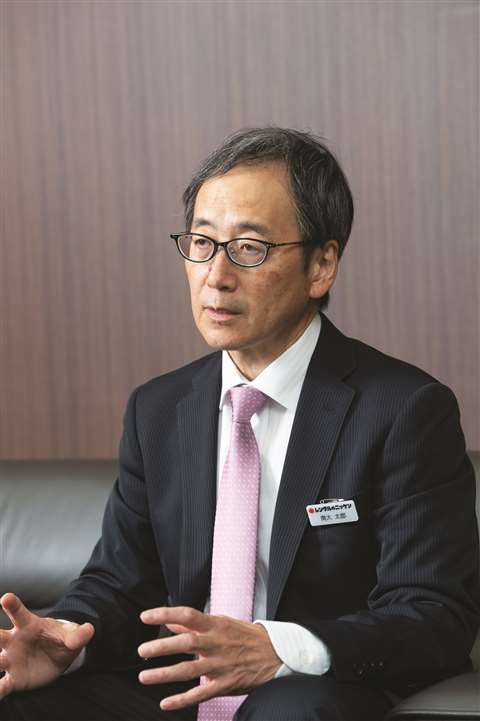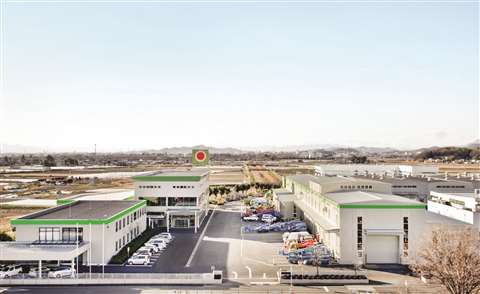Nikken CEO on rental performance in Japan
04 November 2022
Seigo Minamioka, CEO of Nikken Corporation, says the company is performing well despite Japan’s ongoing struggle with Covid-19. Belinda Smart reports.
 Seigo Minamioka, CEO, Nikken Corporation. (Photo: Nikken)
Seigo Minamioka, CEO, Nikken Corporation. (Photo: Nikken)
As this article goes to press, reports have emerged that Japan is experiencing its most severe coronavirus wave to date, driven by the Omicron variant, low immunity and transmission among young people.
In this context, the trading environment could be described as challenging, even for a giant such as Nikken Corporation, one of the “big four” rental companies in Japan - alongside Aktio, Nishio Rent All and Kanamoto – which collectively account for more than 35% of the Japanese market.
Yet according to its CEO Seigo Minamioka, Nikken, which ranked 13 on this year’s IRN 100 Survey, with revenues for 2021 of €877 million - is turning in a solid performance.
This is despite global headwinds from the longer-term pandemic to supply chain constraints, and more domestic ones such as natural disasters and an ageing population.
Urban projects drive demand for rental equipment
Out of its 4,500 types and 1,050,000 items of civil engineering and construction related products, it’s the smaller on-site products - such as lighting, power tools, submersible pumps, and cleaning supplies - that contribute to Nikken’s solid performance, Minamioka tells IRN.
He says demand for these products comes from large-scale urban redevelopment projects; “Japan is also experiencing a surge of development in large-scale warehouses to support online shopping, which expanded with the emergence of Covid-19.”
“In civil engineering work, there is strong demand for replacement of ageing infrastructure such as expressways; while in disaster prevention and mitigation work, there is a lot of construction work related to flood control, such as revetments and rivers.”
Used equipment
Nikken’s NDT subsidiary has also performed well; NDT purchases used machines - including excavators, bulldozers, generators, aerial work platforms, road machines, rough terrain cranes and crawler cranes - from domestic users in Japan, including Nikken Corporation’s rental assets, and sells them to domestic and international customers.
“NDT’s sales to international users have been particularly strong,” he says - the global supply blockages that have resulted in equipment supply constraints the worldover likely account in part for that.
Digitalisation of the rental sector
Also extracting opportunities from challenges is digitalisation, particularly amid concerns over declining numbers of young workers in Japan; “improving business efficiency through digitalisation is an urgent issue.”
“Our company is promoting the digitalisation of various operations, such as online rental for product orders, EDI - electronic data interchange - for invoicing, parts ordering, and inspection of returned products.
“In particular, the number of registered users of the online rental system, which is responsible for receiving orders for products, is increasing steadily, and we hope that this will serve as a catalyst for the digitalisation of the construction equipment rental industry.”
 Nikken Corporation’s headquarters. (Photo: Nikken)
Nikken Corporation’s headquarters. (Photo: Nikken)
Demand for electric construction machinery
Alongside digitalisation, awareness of climate change is growing in Japan, although the rate of electrification of machinery in the construction equipment rental market remains limited to small power tools and some vehicles.
“However, customers’ needs for environmentally friendly machinery have been increasing in recent years, and as we move toward 2030, [the final year of the UN Sustainable Development Goals], we will continue to provide our customers with a wide range of products, including not only rental equipment but also company-owned vehicles used for sales activities.”
“In preparation for 2030, we will promote the use of electric and hydrogen vehicles in our company-owned vehicles used for business activities. In addition, some of our sales offices have installed solar modules to make effective use of natural energy.”
“We are contributing to the promotion of an environmentally conscious society by lending reusable rental products and environmentally conscious machinery for the construction of such cities.”
Meanwhile Nikken’s owner Mitsubishi Heavy Industries’ 2030 strategy plans to continue to build services in civil engineering, construction, shipyards, steel mills, power plants, and railroads and potentially forestry and agriculture.
“We have a long history in this industry, and we intend to continue that tradition.”
STAY CONNECTED



Receive the information you need when you need it through our world-leading magazines, newsletters and daily briefings.
CONNECT WITH THE TEAM









